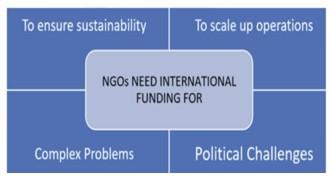Mains Daily Question
Sept. 15, 2023
Q2. The increasing dependence of NGOs on international donors has negatively affected them. Examine. (10 Marks/150 Words)
|
Approach to the answer: Introduction: Type 1: Give definition of NGOs and highlight their importance in brief. Type 2: Give data to support the demand of the question. Body: Address the answer by highlighting the need for international funding – as it’s needed for various functions of NGOs and how it impacts the autonomy of NGOs – as it becomes dependent and loses their uniqueness. Secondly, mention the tension between government and NGOs with the help of examples which have been in the news. Conclusion: ● Type 1: Conclude with importance of bridging trust between government and NGOs. ● Type 2: Conclude with way forward to improve NGOs functioning in India. |
Answer: According to Union Home ministry around 22000 NGOs got Rs 55449 cr foreign funding in last 3 yrs. Advances in communication technology and the rise of online fundraising platforms have made it possible for NGOs to reach a global audience and solicit donations from supporters around the world.
Negative impacts of increasing dependence on international donors:
- Loss of Autonomy and Control: When the NGOs will mobilise the financial resources from the foreign contributors, they have to abide by the principles of the contributor/donor. This can lead to a loss of autonomy, a dilution of their mission and shifting their focus away from grassroots engagement
- Shift in Priorities: The focus on securing funding from international donors can lead to a shift in priorities for NGOs. They may be compelled to prioritise projects that are more likely to attract donor funding rather than addressing critical local issues or long-term sustainable development goals.
- For example: In Narmada Bachao Andolan, in the garb of environmental conservation, NGOs advocated against the dam projects which aimed to provide the basic necessities to locals like water and electricity.
- Power Imbalance Created by Unequal Access to Funding: As local NGOs lack access to such scale of funding, creating a power imbalance that can affect the broader development landscape.
- For example: Global Aid Network (GAIN) implements major poverty alleviation projects in Canada with international funding and has shadowed other local NGOs.
Way Forward:
- Diversify funding sources: NGOs should diversify their funding sources such as seeking out local funding sources, government grants or private donations, as well as developing partnerships with other NGOs.
- Build strong relationships with government and donors: NGOs should work to build strong relationships based on transparency and accountability involving regular communication, reporting, and evaluation of programs.
- Regulatory framework: NGOs must work well within the regulatory framework such as FCRA act and avoid being imposter or acting in vested interests.
- Build partnerships: NGOs can also build partnerships with other NGOs in their local community to share resources and expertise. By working together, they become less reliant on outside funding.
- Strengthen internal capacity: NGOs can also improve their autonomy by building internal capacity and expertise. This can be achieved through training programs, mentoring, and knowledge sharing initiatives.
NGOs play a crucial role in addressing social and environmental issues, promoting human rights, providing humanitarian aid, and advocating for marginalized communities. They must carefully manage their relationships with donors to maintain their autonomy and ensure that their activities remain focused on the needs of local communities.


